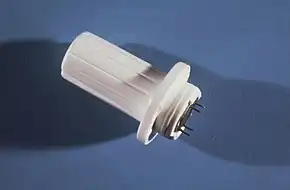Tine test
| Tine test | |
|---|---|
 Tine test | |
| Purpose | diagnosis for tuberculosis |
The tine test is a multiple-puncture tuberculin skin test used to aid in the medical diagnosis of tuberculosis (TB). The tine test is similar to the Heaf test, although the Mantoux test is usually used instead. There are multiple forms of the tine tests which usually fall into two categories: the old tine test (OT) and the purified protein derivative (PPD) tine test. Common brand names of the test include Aplisol, Aplitest, Tuberculin PPD TINE TEST, and Tubersol.[1]
Procedure
This test uses a small "button" that has four to six short needles coated with TB antigens (tuberculin), either an old tuberculin or a PPD-tuberculin. The needles are pressed into the skin (usually on the inner side of the forearm), forcing the antigens into the skin. The test is then read 48 to 72 hours later by measuring the size of the largest papule or induration. Indications are usually classified as positive, negative, or doubtful.[2]
Because it is not possible to control precisely the amount of tuberculin used in the tine test, a positive test should be verified using the Mantoux test.[3]
PPD
Tuberculin is a glycerol extract of the tubercle bacillus. Purified protein derivative (PPD) tuberculin is a precipitate of non-species-specific molecules obtained from filtrates of sterilized, concentrated cultures. It was first described by Robert Koch in 1890 and then Giovanni Petragnani.
A batch of PPD created in 1939 serves as the US and international standard, called PPD-S.[4] PPD-S concentration is not standardized for multiple-puncture techniques, and should be designed for the specific multiple-puncture system.[5]
Comparison to Mantoux test
The American Thoracic Society or Centers for Disease Control and Prevention (CDC) do not recommend the tine test, since the amount of tuberculin that enters the skin cannot be measured.[6] For this reason, the tine test is often considered to be less reliable.
Contrary to this, however, studies have shown that the tine test can give results that correlate well to the Mantoux test.[7][8] If a minor reaction is considered doubtful, the OT test is less accurate and may fail to detect TB, producing a false negative.[2] If all doubtful indications are instead classified as positive, there is no significant difference between the OT test, the PPD tine test, or the Mantoux test.[3]
Furthermore, the tine test is faster and easier to administer than the Mantoux test and has been recommended for screening children.[9][10]
See also
References
- ↑ "Tuberculin, Purified Protein Derivative Drug Information, Professional".
- 1 2 Herzog, C; Birkhäuser, MH (1980). "Tuberkulin-screeningtests in der Praxis. Offene Vergleichsuntersuchung von Tine-Test und Monotest versus Mantoux 1:1000 bei 119 ambulanten Patienten" [Tuberculin screening tests. Open comparative trial of Tine-Test and Monotest versus Mantoux 1:1000 (10 TU) in 119 outpatients]. Schweizerische Medizinische Wochenschrift (in German). 110 (48): 1817–21. PMID 7280608.
- 1 2 Steiner, P.; Rao, M.; Victoria, M.; James, P. (1980). "A Comparative Study of the Old Tuberculin Tine Test and the PPD-Tine Test". Clinical Pediatrics. 19 (6): 389–1. doi:10.1177/000992288001900602. PMID 7371350. S2CID 9048956.
- ↑ Seibert, F. B.; Glenn, J. T. (1944). "Tuberculin purified protein derivative: preparation and analyses of a large quantity for standard". American Review of Tuberculosis. 44: 9.
- ↑ Dacso, CC; Walker, HK; Hall, WD; Hurst, JW (1990). "Skin Testing for Tuberculosis". PMID 21250210.
{{cite journal}}: Cite journal requires|journal=(help) - ↑ https://www.cdc.gov/tb/publications/slidesets/selfstudymodules/module3/d_link_text.htm%5B%5D
- ↑ Rudd, RM; Gellert, AR; Venning, M (1982). "Comparison of Mantoux, tine, and 'Imotest' tuberculin tests". Lancet. 2 (8297): 515–8. doi:10.1016/s0140-6736(82)90599-2. PMID 6125678. S2CID 22415396.
- ↑ Aysha, MH; Abdou, TJ; Lulu, AD (1984). "Mantoux and Tine tuberculin tests compared in Kuwait". European Journal of Respiratory Diseases. 65 (3): 224–8. PMID 6723830.
- ↑ Hanzel, G. D.; Rogers, K. D. (1964). "Multiple-Puncture and Mantoux Tuberculin Tests in High School Students: A Comparative Study". JAMA: The Journal of the American Medical Association. 190 (12): 1038–42. doi:10.1001/jama.1964.03070250020005. PMID 14217948.
- ↑ Pan, Wenli; Matizirofa, Lyness; Workman, Lesley; Hawkridge, Tony; Hanekom, Willem; Mahomed, Hassan; Hussey, Gregory; Hatherill, Mark (2009). Pai, Madhukar (ed.). "Comparison of Mantoux and Tine Tuberculin Skin Tests in BCG-Vaccinated Children Investigated for Tuberculosis". PLOS ONE. 4 (11): e8085. Bibcode:2009PLoSO...4.8085P. doi:10.1371/journal.pone.0008085. PMC 2779491. PMID 19956612.
